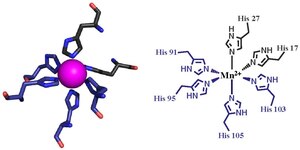Calprotectin
Calprotectin is a protein complex primarily found in neutrophils, a type of white blood cell. It is composed of two proteins, S100A8 and S100A9, which are members of the larger S100 protein family. Calprotectin has antimicrobial properties and plays a significant role in the regulation of inflammatory processes within the body. Its ability to bind calcium and zinc ions allows it to participate in various cellular functions, including the modulation of inflammatory responses and the inhibition of microbial growth.
Function and Significance
Calprotectin's primary function is in the immune response, where it acts as an antimicrobial agent and modulates inflammation. By sequestering essential nutrients such as zinc, calprotectin inhibits the growth of pathogens, a process known as nutritional immunity. Additionally, its presence in high concentrations at sites of inflammation makes it a useful marker for inflammatory conditions.
Clinical Use
Calprotectin is most commonly measured in feces, where elevated levels can indicate the presence of an inflammatory condition in the gastrointestinal tract, such as inflammatory bowel disease (IBD), including Crohn's disease and ulcerative colitis. It is a valuable biomarker for distinguishing between IBD and irritable bowel syndrome (IBS), which is not characterized by inflammation. Measuring fecal calprotectin levels can help in the diagnosis and monitoring of these conditions, guiding treatment decisions and assessing response to therapy.
Measurement
The measurement of calprotectin levels is typically performed using an enzyme-linked immunosorbent assay (ELISA) or other similar immunoassays. These tests quantify the concentration of calprotectin in fecal samples, providing a non-invasive method for assessing intestinal inflammation.
Limitations
While fecal calprotectin is a useful marker for gastrointestinal inflammation, it is not specific to any single condition. Elevated levels can be seen in various inflammatory states, including infections, cancer, and use of nonsteroidal anti-inflammatory drugs (NSAIDs). Therefore, calprotectin levels must be interpreted in the context of clinical findings and other diagnostic tests.
Research Directions
Research continues to explore the broader applications of calprotectin measurement in clinical practice, including its potential role in predicting disease course and response to treatment in conditions like IBD. Studies are also investigating the role of calprotectin in other inflammatory conditions beyond the gastrointestinal tract.
Transform your life with W8MD's budget GLP-1 injections from $125.
W8MD offers a medical weight loss program to lose weight in Philadelphia. Our physician-supervised medical weight loss provides:
- Most insurances accepted or discounted self-pay rates. We will obtain insurance prior authorizations if needed.
- Generic GLP1 weight loss injections from $125 for the starting dose.
- Also offer prescription weight loss medications including Phentermine, Qsymia, Diethylpropion, Contrave etc.
NYC weight loss doctor appointments
Start your NYC weight loss journey today at our NYC medical weight loss and Philadelphia medical weight loss clinics.
- Call 718-946-5500 to lose weight in NYC or for medical weight loss in Philadelphia 215-676-2334.
- Tags:NYC medical weight loss, Philadelphia lose weight Zepbound NYC, Budget GLP1 weight loss injections, Wegovy Philadelphia, Wegovy NYC, Philadelphia medical weight loss, Brookly weight loss and Wegovy NYC
|
WikiMD's Wellness Encyclopedia |
| Let Food Be Thy Medicine Medicine Thy Food - Hippocrates |
Medical Disclaimer: WikiMD is not a substitute for professional medical advice. The information on WikiMD is provided as an information resource only, may be incorrect, outdated or misleading, and is not to be used or relied on for any diagnostic or treatment purposes. Please consult your health care provider before making any healthcare decisions or for guidance about a specific medical condition. WikiMD expressly disclaims responsibility, and shall have no liability, for any damages, loss, injury, or liability whatsoever suffered as a result of your reliance on the information contained in this site. By visiting this site you agree to the foregoing terms and conditions, which may from time to time be changed or supplemented by WikiMD. If you do not agree to the foregoing terms and conditions, you should not enter or use this site. See full disclaimer.
Credits:Most images are courtesy of Wikimedia commons, and templates, categories Wikipedia, licensed under CC BY SA or similar.
Contributors: Prab R. Tumpati, MD


